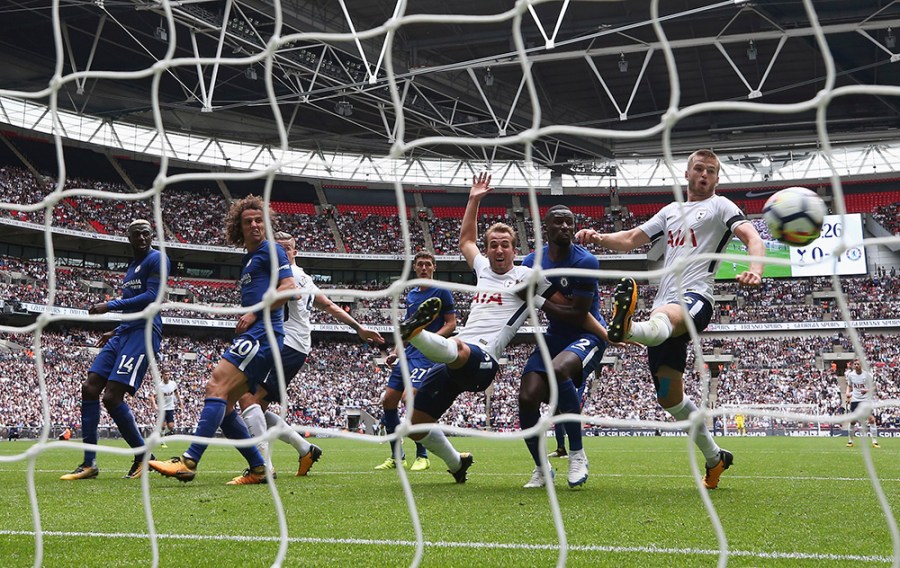The opening stages of the season have seen Chelsea’s volatile manager Antonio Conte in the midst of conflicting and confusing events and utterances. One moment after a dismal two-match start to the season we learn that the bookmakers have established him as favourite to be first Premiership manager to be dismissed. Then, bewilderingly, he states that his Chelsea team, which ran away with last season’s Premiership, needs radical rebuilding, and that he is looping forward to being in charge for the next four years.
What of Tottenham, whom Chelsea beat in the Premiership match at Wembley, though without both the effervescent Eden Hazard and England’s defender Gary Cahill? Wembley – where they will play all season – seems ill omened to them to a degree.
Distant shades of that wonderful FA Cup Final solo goal supreme by them there by the Argentinian Ricky Villa in 1981. Spurs in those years seemed to relish playing at Wembley. Not now, where a long string of poor results and only a single victory are the dismal record. They shouldn’t, on the balance of play, have lost to Chelsea’s weakened side last weekend. Nor would they have done so but for that strange and shocking error by their usually exemplary goalkeeper, Hugo Lloris.
But then Wembley right back in the 1940s was nicknamed The Goalkeeper’s Graveyard. Buried metaphorically deepest of all was Arsenal’s 1927 FA Cup Final keeper, Wales’ Danny Lewis, who allowed a tame shot to slip through his hands and off his jersey to give Cardiff City success. The only time the Cup has gone out of England.
***************
It is tempting to think that Arsene Wenger is suffering from a severe case of bravado. Alexis Sanchez, Mesut Ozil, Alex Oxlade-Chamberlain are all at the end of the their contracts come the close season. Which means that when it arrives, they could all walk out for nothing, thus depriving the Gunners of many millions of transfer fees.
Jack Wilshere, who came back from a loan at Bournemouth and a broken leg, is also due to be free in the close season, but this, despite the fact that he is that rare phenomenon, an Arsenal player who has been with the club since early boyhood, a somewhat less expensive figure.
Sanchez, as we know, yet to play for the team this season at the time of writing, is probably the best and most influential player the Gunners have on their books. He has emphasised his wish to move on. No doubt because, for all this goals and efforts last season, Arsenal could finish only fifth in the Premiership, and thus cannot compete in the European Champions Cup.
Ozil’s wage demands are apparently huge, in the £200,000 a week bracket, but is he in his strange inconsistency, his unpredictability, remotely worth such money, or even worth keeping? If I were Wenger I would jump at any decent offer.
But Wenger’s casual commitment to keeping all these players shows once again how dominant a force and figure he is at Arsenal. Last season numerous fans made plain they wanted him out. I myself believe that for all his past triumphs, he should really have gone a couple of seasons ago. Winning last season’s FA Cup, though the team rose high to the occasion in the Final, could not obscure such memories as the two shocking 5-1 European Champions Cup defeats by Bayern Munich.
But as one has pointed out before, Wenger remains the dominant and decisive figure at Arsenal, where a docile board – though it did show transient signs of life at the end of last season – is in his thrall. But harsh financial realities may oblige the board and chief American shareholder to demand that players who would ultimately depart gratis must now be sold.
********************
A little learning is a dangerous thing. As evidenced when recently Sam Wallace, the chief football writer of the Daily Telegraph, decided he would embellish his article with a quotation from none other than Karl Marx. To whom he attributed the saying, “History repeats itself; the first time as farce, the second as tragedy.” Which doesn’t seem to make much sense.
What Marx in fact said was, “History repeats itself; the first time as tragedy, the second as farce.”
Beware what the detective story writer Edmund Crispin long ago called “the unnecessary cross reference”.







